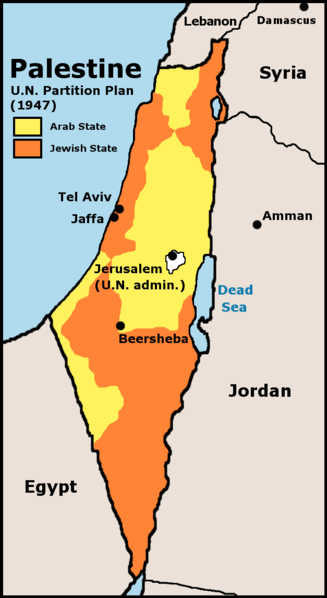Christians didn’t have to wait until the latest round of campus protests against Israel to know that discussions about Israel and Palestine can inspire passionate moral debate about what justice really means in this case.

A decade ago, the Presbyterian Church (USA) was sharply divided between partisans on both sides of a denominational debate about divestment that news reports described as “passionate.” In 2012, the denomination’s General Assembly voted by the narrowest of margins – 333 to 331 – to reject a motion to divest from companies that did a substantial amount of business with Israel. Two years later, the vote was almost as narrow – 310 to 303 – but the outcome was different: the PCUSA voted this time in favor of divesting from Israel. Immediately Jewish organizations that had been allied with the denomination denounced the move, and there were angry debates within the denomination as well. People wanted to know how a denomination that had once been such a strong supporter of Israel could begin treating it as an “apartheid state” – a phrase the denomination adopted in a 2022 resolution on Israel.
After the attacks of October 7, some in the Protestant world – especially the evangelical Protestant world – were quick to rally to Israel and to brook no criticism of any of its policies toward the Palestinians. Christians United for Israel, an evangelical organization founded by pastor John Hagee that now has 10 million members, pledged millions of dollars in support of Israel immediately after Hamas’s attack. And though Christianity Today has historically been more moderate and less overtly Zionist, it too responded to the beginning of the war with an editorial by Russell Moore encouraging Christians to “stand with Israel.”
Meanwhile, Churches for Middle East Peace (CMEP), of which the PCUSA is a member, called for a ceasefire within weeks of the beginning of the fighting. In February, the PCUSA’s mission agency warned that the United States was “complicit in the possible genocide of Palestinians in Gaza” because of its aid to Israel.
It might seem that Christians on either side of this debate are diametrically opposed in their thinking. One group wants justice for the Palestinians. In the view of their opponents, they have abandoned the concern for Israel that many American Protestants (both mainline and evangelical) had for much of the second half of the twentieth century.
The other side is adamant about being a blessing to Israel in accordance with the mandate of Genesis 12 and other scriptures. In the view of their critics, they have turned a deaf ear to the pleas of the Palestinians.
But perhaps there’s a way to find more common ground among the disputants than it might first appear. As I’ve reflected on the possibility for common ground over the past few weeks and months, I found inspiration in the insights of an evangelical Baptist ethicist who taught at Fuller Theological Seminary in the late twentieth century. The late Glen Stassen may not be a household name among American evangelicals, but his commitment to “just peacemaking” offers some needed wisdom for our current moment.
![Just Peacemaking: The New Paradigm for the Ethics of Peace and War [Book]](https://m.media-amazon.com/images/I/61oYEUStxrL._AC_UF1000,1000_QL80_.jpg)
Stassen, who was the son of Minnesota Republican governor Harold Stassen, was deeply committed to the path of peace, but as the son of a politician who was a presidential aspirant, he was no stranger to real-world political conflicts, and he was therefore no starry-eyed idealist. Making peace is difficult, he knew – but he was also convinced that it was possible. Over the course of several decades, he developed some practical steps for resolving longstanding conflicts with both justice and peace.
His first principle of just peacemaking was a commitment to mutual security for both parties in a conflict. Countries go to war with each other because they fear the other country is a threat to their security – so the key to creating a “just peace” between the two sides is to get both sides to affirm the security of the other. “The security of each adversary depends on the security of both adversaries,” David Gushee wrote in a summary of Stassen’s thinking. “There can be no security for either party unless both parties are confident that their reasonable interest in their own security is respected.”
A country that is truly interested in peace will take the first initiative to reach out to its enemy to discuss possibilities for peace, Stassen argued. And those initiatives will provide some sort of assurance of the others’ security, as well as an attempt to make amends for past wrongs rather than demonize the other.
So, what does this mean for the current conflict in Israel?
It means that the future security of Israel depends on guaranteed security for a Palestinian state. And the future security of a Palestinian state depends on the Palestinians’ guarantee of security for Israel.
If partisans on all sides of this conflict would affirm their commitment to the security of an Israeli Jewish state while talking about the rights of the Palestinians, and if they could affirm their commitment to justice for the Palestinians while talking about their support for Israel, both groups would discover some common ground.
To do that, it’s important to remember a bit of history from this region. It’s important to remember, for instance, that Jews have lived in Israel / Palestine continuously for thousands of years, and that the creation of the modern state of Israel had the imprimatur of a United Nations mandate in 1947, which was passed in the immediate aftermath (and in recognition of) the massive genocidal tragedy of the Holocaust. To pretend that the Jews have no right to have a state in Israel ignores a great deal of history. The principles of just peacemaking in this conflict require that we begin with a commitment to Israel’s right to exist – and, by extension, to a right to a peaceful, secure existence in which it is not threatened by organizations or states that want to annihilate it.
There are good reasons for Christians to support Israel and its right to exist. One is the issue of justice: Israel is a legitimate state whose rights must be upheld in the same way that any state’s rights to existence and security must be honored. But another reason is the special tie that Christians have to Israel and the Jewish people, both because of a shared history and because of a history of injustice. Christian Europe was guilty of centuries of anti-Semitic policies and actions. Even the United States, while not guilty of the pogroms that were part of some European countries’ policies toward the Jews, engaged in plenty of anti-Semitic actions. It was partly because of a shared sense of horror over the Holocaust and a realization that the world’s Jews needed a safe haven from the anti-Semitic horrors that the United States had done too little to oppose that the United States during the Truman administration was so quick to extend diplomatic recognition to the newly created state of Israel.
As a non-dispensationalist with a Reformed amillennial lens for interpreting scripture, I don’t believe that the Bible’s prophetic promises toward Israel pertain to the political state of Israel today – although I recognize that for millions of American evangelical Christians who hold a different interpretation of biblical prophecy, the Bible does provide a clear mandate for supporting the nation of Israel. But even without a dispensational reading of scripture or a belief in a modern fulfillment of the Bible’s land promises to Israel, I think that Romans 11 offers a clear mandate for a special permanent non-Jewish Christian respect for the Jewish people, since – as that passage of scripture points out – it is from Judaism that Christianity is descended. That certainly doesn’t mean that we should necessarily endorse everything that Israel does. But it does mean that Christianity has a special relationship to Judaism and a particular obligation to respect the Jewish people. Christians have an obligation to renounce whatever anti-Semitism has characterized Christianity in the past and to guard against its contemporary or future reappearance.
But at the same time, Christians also have good reasons to support the Palestinians. Arabs have lived in Palestine for at least 1,300 years, if not longer, and they, too, expect the right to self-determination and equality. Christians have an obligation to support Palestinian nationhood for reasons of justice.
They also have good reason to support Palestinians as fellow members of the body of Christ. The small and rapidly diminishing Arab Christian population among the Palestinians is leaving Israel in droves – and the poor economic conditions and pressure they face from Israeli occupation are at least a partial contributing factor to this phenomenon, as a Christianity Today article noted in 2020.
So, there are good reasons to support both Israel and the Palestinians, and we shouldn’t have to choose between the two. Historically, both the West and the United Nations have tried to honor the rights of both.
When the United Nations voted to create the Jewish state of Israel, they divided British Palestine into two sections and gave one section to the Palestinians and the other to the Jews.


1947 UN partition plan for Israel / Palestine and 1955 UN map of Israel (with pre-1967 boundaries) (Wikipedia)
The Palestinians then promptly attacked Israel. Although Israel defeated the Palestinians, Arab leaders in the region – especially the Egyptian president Gamul Abdel Nasser – made it a point of supporting the Palestinians and denying Israel’s right to exist. In 1964, the Palestinian Liberation Organization (PLO) was founded with the support of Egypt as a militant group dedicated to Israel’s destruction and willing to use terrorism to accomplish its goals. Egypt and other Arab countries launched two major attacks against Israel – one in 1967 and the other in 1973 – with the intent of wiping Israel off the map. With substantial help from American weapons, Israel quickly beat back most of those attacks. After the first war in 1967, they gained control of the Arab-occupied parts of Palestine – the West Bank and the Gaza Strip.
But contrary to what some might imagine, Israel never acquired the legal right to hold that territory. The United Nations passed a resolution (UN resolution 242) after the Six-Day War in 1967 demanding that Israel withdraw from that territory. “Emphasizing the inadmissibility of the acquisition of territory by war and the need to work for a just and lasting peace in which every State in the area can live in security,” the United Nations Security Council unanimously declared, Israel must give the territory back to the Palestinians. In the nineteenth and early twentieth centuries, Western countries commonly annexed territory through war, but in the late twentieth century, after World War II, the great powers of the world were unanimous in saying that such behavior was illegal.
On paper, Israel agreed. It did not claim the right to permanently occupy the Palestinian territories. It said that its temporary occupation of the territories was needed to secure its own safety, but over time, some of its traditional enemies renounced their erstwhile desire to attack Israel. In 1978-79, Egypt made peace with Israel. In 1993, the PLO renounced terrorism and agreed that Israel had a right to exist. In return, Israel agreed to a two-state solution. Even Benjamin Netanyahu pledged his support for a two-state solution in 2009 and again in 2015.
But despite its assurances, Israel has illegally used its occupation of the West Bank to build settlements for its citizens. The result has been massive Palestinian frustration. The Palestinian Authority – the most politically moderate Palestinian organization and the best chance that Israel had for a peaceful Palestinian neighbor – has looked embarrassingly weak as a result, and many Palestinians have therefore turned to more radical (and more autocratic) organizations. The result has been less security for Israel.
As the Christian Century declared earlier this spring, “The marginalization of Palestinian moderates may have contributed to Hamas’s rise in Gaza in the first place—and this should be avoided at all costs in the West Bank.”
Some in Israel recognize this. On the Israeli left, support for a two-state solution, which was already strong before the attacks of October 7, became even stronger during the weeks after the attacks, because Israelis on the left believe that a two-state solution will not only bring justice to the Palestinians but will also enhance Israel’s own security. But among right-wing and moderate Israelis, support for a two-state solution, which was already low, became even lower after the attacks, because Israelis on the right see a Palestinian state as a breeding ground for terrorists and a threat to Israel’s future.
During the past half-century, most of the Arab world has become much more accepting of Israel than it was in the early 1970s. Egypt, once Israel’s inveterate enemy, officially recognized Israel’s right to exist after the Camp David Accords of 1978 and has been at peace with Israel ever since. Jordan has made peace with Israel. Even Saudi Arabia, the most conservative of the Arab Muslim states, appears ready to extend an olive branch to Israel if Israel will take concrete steps toward the formation of a Palestinian state. Similarly, among the Palestinians themselves, the Palestinian Authority recognizes Israel’s right to exist, which was once unthinkable.
There is more support among Arab states than ever before for Israel’s right to exist – if Israel will genuinely take immediate steps toward a state for the Palestinians. If Israel does so, it will undercut the claims of the remaining groups in the Middle East that are hostile to Israel, such as Hamas, Hezbollah, and Iran.
Those who care about both Israel and the Palestinians need to denounce Hamas and all other groups that support terrorism against Israel or deny its right to exist.
But at the same time, they need to insist that Israel end its settlements in the West Bank and require Israelis living in the occupied territories to move within Israel’s pre-1967 boundaries. They need to insist that Israel act on its prior stated commitments to the formation of a Palestinian state.
Right now, Israel is facing an impasse with most of the rest of the world because of its refusal to comply with a previous UN mandate and its own previously stated commitment to allow the formation of a Palestinian state.
Pope Francis has joined the call for a two-state solution, which he has linked to his demand for an immediate end to the current war. In praying for peace in Israel, he is praying that Israel and Palestine “may be two states, free and with good relations.”
World opinion on this is nearly unanimous: A United Nations resolution to admit a Palestinian nation as a member state passed by a vote of 143 to 9 in the General Assembly this month. One of the nine votes against the resolution came from the United States, which favors a Palestinian state, but said that it needed to be created through a negotiation process with Israel and that it must come with the assurance that Gaza will not be a “platform for terrorism.”
This last point is a reasonable demand, I think. But what is not reasonable is either a categorical refusal to recognize the rights of Palestinians or a refusal to recognize Israel’s right to exist as a secure state.
The most promising path to peace and to Israel’s security is also the best path forward at this point to justice for the Palestinians.
That path is Israel’s commitment to a Palestinian state, a commitment which will need to be accompanied with outreach to the most moderate Palestinian governing group – the Palestinian Authority – along with neighboring Arab states that are willing to work with Israel to guarantee Israel’s security in exchange for the recognition of a Palestinian state. This diplomatic move will isolate Hamas, reduce radicalism among Palestinians in Gaza and elsewhere, and win back the good will of the world that has become increasingly frustrated with the refusal of Benjamin Netanyahu’s government to honor Israel’s previously made promises of a Palestinian state. In the end, it will lead to a more secure Israel – and a more secure Palestinian people.
This is a path to peace that will fulfill the principles that Glen Stassen outlined for “just peacemaking.” And as a result, it’s a peace that Christians who love both Israel and the Palestinians should support.













